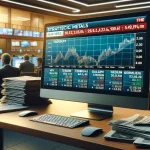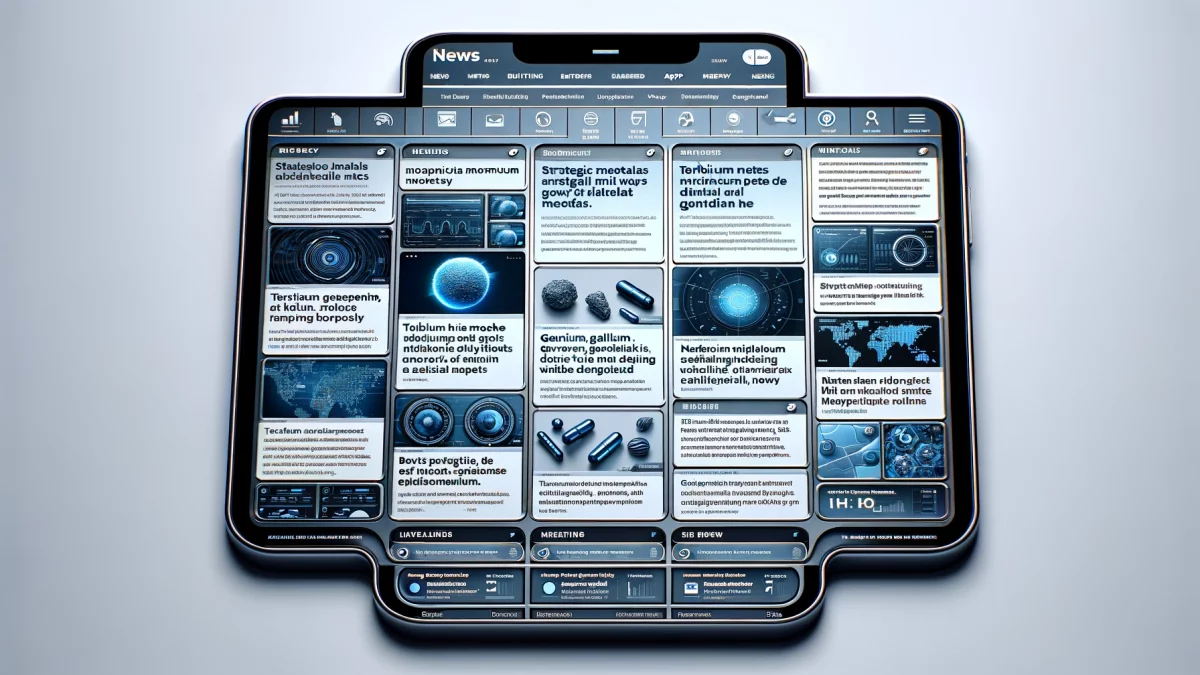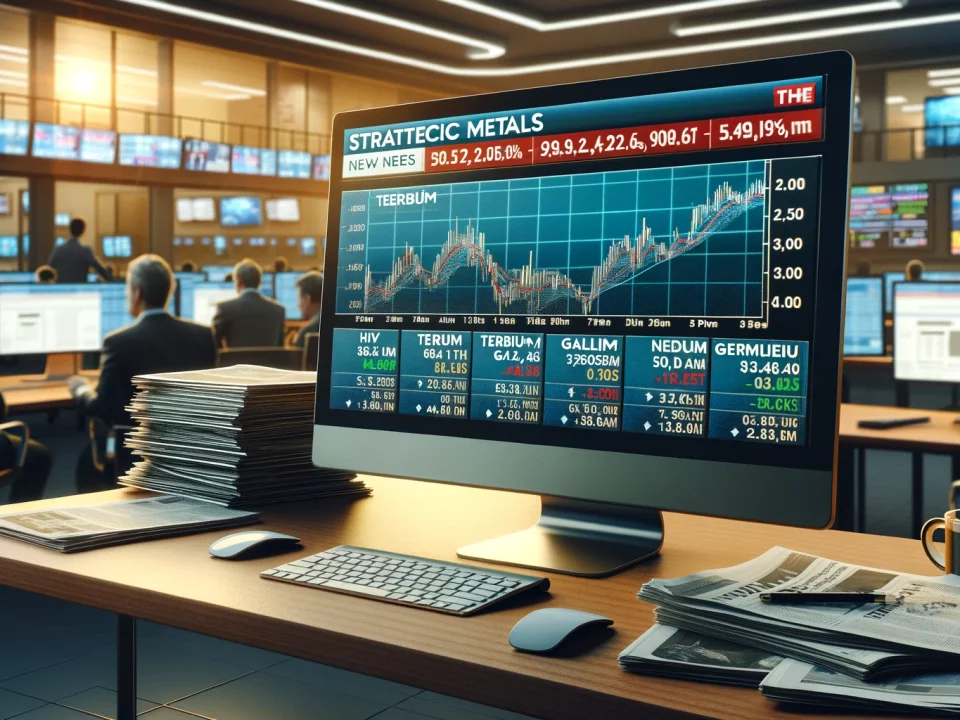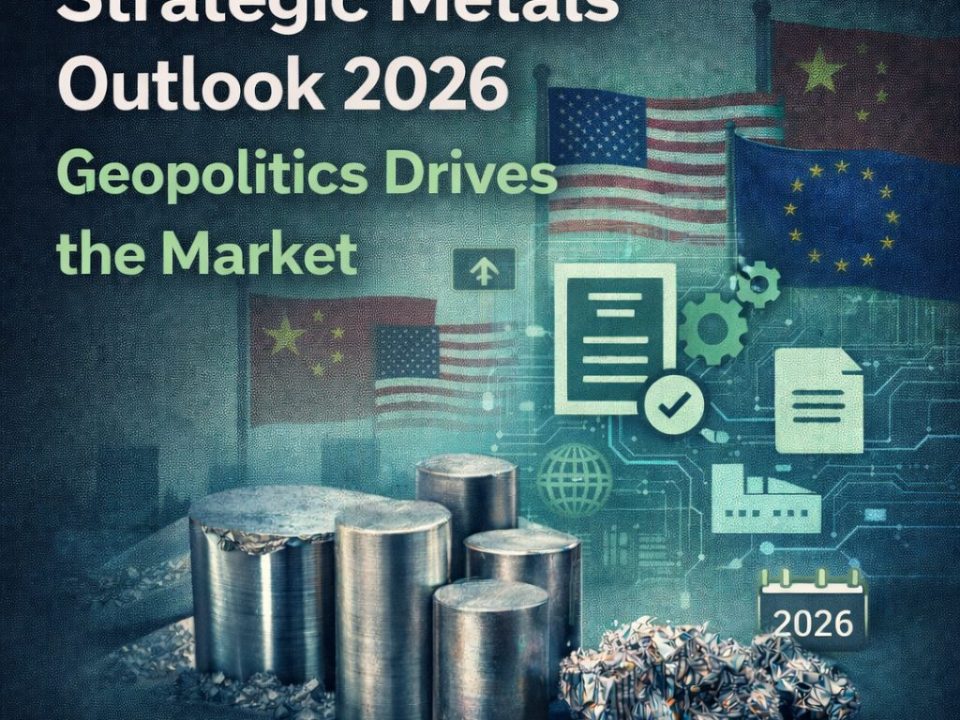
Weekly News Review June 3 – June 9 2024
June 9, 2024
Weekly News Review June 17 – June 23 2024
June 23, 2024Welcome to our weekly news review.
UTAH, NORTH AMERICA : FIRST RARE EARTHS FROM MONAZITE IN DECADES –
Energy Fuels announces commercial production.
Energy Fuels has announced that it will start commercial production of separated neodymium-praseodymium (NdPr) this month. NdPr is an essential ingredient of high-performance magnets such as those used in wind turbines.
The company’s White Mesa mill in Utah can process the feedstock and monazite sands from Florida and Georgia so that the separated NdPr meets the industry’s specifications.
Following the refining stage, the facility will produce alloys that serve as a preliminary stage in producing magnets.
The Chemours Company will initially provide the monazite sands, while Energy Fuels plans to mine them eventually. The company has secured promising deposits in Brazil for this purpose (we reported). Brazil is one of the countries with the largest reserves of this group of raw materials, but mining is currently only taking place on a limited scale.
EU ANNOUNCES TARIFF RATES ON CHINESE-MADE ELECTRIC VEHICLES:
On Wednesday, the EU Commission published the provisional import tariff rates on China-made battery electric vehicles (BEVs). The Commission specified the rates for three sampled companies: 17.4 percent for BYD, 20 percent for Geely, and 38.1 percent for SAIC. Other companies cooperating with the investigation would face a tariff of 21 percent, and non-cooperating companies would face a maximum rate of 38.1 percent. The Commission specifically named Tesla as a company that may receive an individually calculated rate and added that other companies not sampled could ask for a review with a deadline of nine months. Discussions with Chinese authorities are ongoing. Should these not come to a solution, these rates will become effective on 4 July.
The move follows a lengthy investigation into Chinese government subsidies on EVs launched in October last year (we reported). The FT adds that the tariffs will hit all EVs made in the People’s Republic, including ones from Western companies like Tesla, Dacia, or BMW. According to research firm Transport & Environment, 19.5 percent of European electric vehicles sold in 2023 were made in China, which the FT reports as roughly ten billion Euros. The additional import levy could thus cost approximately two billion Euros.
KOREA – SILK ROAD: SOUTH KOREA TAPPING CENTRAL ASIAN STATES FOR STRATEGIC METALS –
President Yoon Suk Yeol will visit Turkmenistan, Kazakhstan, and Uzbekistan this week.
Following the Africa-Korea Summit last week, South Korea continues seeking more critical minerals sources. According to The Korea Times, this week, President Yoon Suk Yeol will travel to Turkmenistan, Kazakhstan, and Uzbekistan to expand collaboration on raw materials and other vital sectors.
During the first station, Yoon will meet President Serdar Berdimuhamedow in Ashgabat, Turkmenistan, to attend a memorandum signing ceremony. His second station will lead Yoon to Kazakhstan’s capital, Astana, for a three-day visit, where he will attend a summit with President Kassym-Jomart Tokayev. For the final station, Yoon will travel to Uzbekistan to meet President Shavkat Mirziyoyev and attend a summit with business representatives in Tashkent.
Linking Korea’s High-Tech Industry With Central Asia’s Resources
During the week-long trip, Yeol is expected to announce the “K-Silk Road” regional strategy that seeks to connect South Korea’s high-tech industry with the vast resources of Central Asia.
The East Asian country is home to some of the most prominent players in the semiconductor and automotive industries but lacks the necessary critical minerals within its borders. South Korea depends mainly on the giant China, a raw materials giant, but it is looking to diversify its supply chains.
Following the state visits, South Korea plans to establish a summit with all five Central Asian states, including Kyrgyzstan and Tajikistan, similar to the Africa-Korea summit last week. The inaugural meeting is set for next year.
AUSTRALIA – RESEARCHERS WORKING ON A FINGERPRINT FOR RAW MATERIALS:
Australian scientists use the chemical properties of critical materials to determine their origin.
The energy transition and electromobility constantly drive the demand for critical raw materials, from batteries to motors. To ensure the sustainability of resource origins, the focus is shifting to measures that promise transparency along the supply chain. As Nikkei Asia reports, this is now within reach for the battery metal lithium.
Scientists at the John de Laeter Centre de Curtin University in Western Australia are using the chemical properties of the material under investigation to trace the provenance. This makes it possible to determine which country and deposit a sample comes from. Prokopiy Vasilyev and his research team want to use the technology for other materials besides lithium in the future. They say that it is possible to make statements about processing and refinement.
Australia has been establishing itself as an alternative supplier of raw materials such as lithium and rare earths for some time. At the end of May, the country signed a raw materials agreement with the European Union. A few months earlier, Resources Minister Madeleine King had expressed skepticism about whether European companies would pay a premium for sustainably produced materials. Proof of the supply chain, which further reflects ESG criteria (i.e., environmental, social, and governance standards), could bring movement to this debate.
CRITICAL METALS CORP TO PURCHASE CONTROLLING STAKE IN GREENLAND RARE EARTH PROJECT:
The company also owns the Wolfsberg lithium project in Austria.
Critical Metals Corp has signed a binding agreement to acquire a controlling stake in Greenland’s Tanbreez rare earth project. The deal, valued at $211 million, will net the company 92.5 percent of the equity in the project, according to a press release. The project is in the south of Greenland, close to airports and harbors, making transporting raw materials to processing facilities in Europe or North America less complicated, the company said.
The previous owner, Tanbreez Mining, acquired a mining permit in 2020 and announced last year that production would start sometime in 2024 (we reported). Tanbreez Mining estimated the deposit to contain 19 million tons of rare earth, with 30 percent coveted heavy rare earth, such as dysprosium or terbium. For example, the production of this subgroup used in permanent magnets is currently primarily dominated by China.
In addition, the company stated that the project would contain minimal harmful byproducts associated with some rare earth deposits, such as the radioactive elements uranium or thorium. Fellow mining company Energy Transition Minerals has yet to secure a mining license from the government for the Kvanefjeld project in Greenland because of the uranium concentration within the deposit (we reported).
Project Important for Western States, but Estimates Could Be Revised –
With the estimated resources, the percentage of heavy rare earths, and the low concentration of radioactive byproducts, the project has gained attention among Western states seeking to diversify supply chains. However, Critical Metals emphasized that the estimates could change with additional tests and exploration efforts in the future.
Critical Metals was formed in February through the merger of Sizzle Acquisition Corp. and European Lithium. It was listed on the NASDAQ afterward. In addition to Tanbreez, the company also owns the Wolfsberg lithium project in the south of Austria, which, according to the company, is the only fully permitted mine in Europe to produce battery-grade lithium. Production is expected to start in 2025, with the first client being German carmaker BMW.
CHINESE ELECTRIC VEHICLES: EU TO IMPOSE 25% IMPORT TARIFFS:
It will affect all-electric vehicles made in the People’s Republic, including those made by Western companies.
According to the Financial Times, the European Union will notify carmakers today that it will impose a provisional additional 25 percent import levy on China-made electric vehicles, citing people familiar with the matter.
The move follows a lengthy investigation into Chinese government subsidies on EVs launched in October last year (we reported).
The FT adds that the tariffs will hit all EVs made in the People’s Republic, including ones from Western companies like Tesla, Dacia, or BMW. According to research firm Transport & Environment, 19.5 percent of European electric vehicles sold in 2023 were made in China, which the FT reports as roughly ten billion Euros.
The additional import levy could thus cost approximately two billion Euros.
The United States also raised the levy on Chinese EVs last month, quadrupling existing tariffs from 25 to 100 percent (we reported). U.S. President Joe Biden and EU Commission President Ursula von der Leyen spoke on separate occasions of Chinese goods “flooding” world markets through artificially low prices.
However, the EU was unlikely to match the U.S. rate, as the two markets differ in importance for Chinese exports. The U.S. is not a key market for EVs made in the People’s Republic, while the EU is becoming increasingly important.






